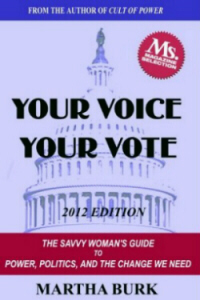
Mary Robinson was the first woman ever elected to the presidency of Ireland, serving from 1990 to 1997. She came up in Irish politics via the Dublin city council, and the Irish senate, where she championed the rights of women, gay rights, and the cause of the poor.
After leaving the presidency she served as the United Nations High Commissioner for Human Rights, from 1997 to 2002. She was praised for that work in 2009, when President Obama awarded her the nation's highest civilian honor, the Presidential Medal of Freedom.
Robinson is widely regarded as a transformative figure in the presidency of Ireland, and she has been an inspirational figure for women and girls around the world. Today she heads the Mary Robinson Foundation - Climate Justice. I interviewed her recently for my radio show Equal Time With Martha Burk, in anticipation of the U.N. Conference on Sustainable Development coming up in Rio in June.
Your parents were both medical doctors. That doesn't sound particularly political. What kindled your interest in politics?
I grew up in a very nonpolitical family. I sometimes say my interest in human rights came from the fact that I was wedged between four brothers, so I had to be interested in equality.

I have followed the debate in the U.S. It is so unfortunate. This is the 21st century. It was very controversial in Ireland. I felt strongly about it, because the law was completely out of touch with people's lives. I was taken aback by the level of public hatred that I was faced with, but I realized if you really believe in something, you have to be prepared to pay a price.
Going from being a senator with an unpopular cause to the presidency was quite a leap.
Yes, the oddsmakers were marking it as 100 to 1 against my being elected. There are harder knocks for women candidates. But there were many Irish women that voted for me.
You resigned the presidency a couple of months before your term was up to take the position of U.N. Commissioner for Human Rights.
It was unusual, but the office of High Commsioner was in a crisis. The office is so underfunded. The first two months were the most difficult of my life. It was such a tough job.
In the U.S. we still haven't ratified the women's human rights treaty: the Convention on the Elimination of all forms of Discrimination Against Women.
That treaty is extraordinarily important. It is remarkable, and not helpful internationally, that the United States has not ratified it. But Secretary Clinton has put women's empowerment front and center, and that is noticed around the world.
I know that U.S. Ambassador for Global Women's Issues Melanne Verveer has been active with you in your climate justice work for gender-informed climate policy.
She's been very supportive on the importance of women having access to affordable renewable energy and food security. Greenhouse gases and climate change are having a big effect on poverty and food security. Women are the majority of farmers, and things are going to be worse for them. We need women in the lead on climate change.
Rio+20: The U.N. Conference on Sustainable Development is coming up in June. Will women be a big part of it?
Yes. Dilma Rousseff, the current president of Brazil, is very supportive. We hope energy issues, women's voice, women's empowerment, and women's economic contributions will come out very strongly.
You have said that we can have job growth without increasing greenhouse gas emissions. How do you envision that happening?
It will take a huge effort: rethinking how we use energy, and bringing on affordable, renewable energy to billions of women worldwide in poverty. But the advanced countries especially have to realize we can have growth with renewable energy. If you want to get change behavior, I believe it's the women who are more likely to get the message. We can't continue to deny that the climate is changing because of human conduct. We have to understand that we can change course, and yet we can have a good life.
* * * * *
Listen to Mary Robinson's full interview:
